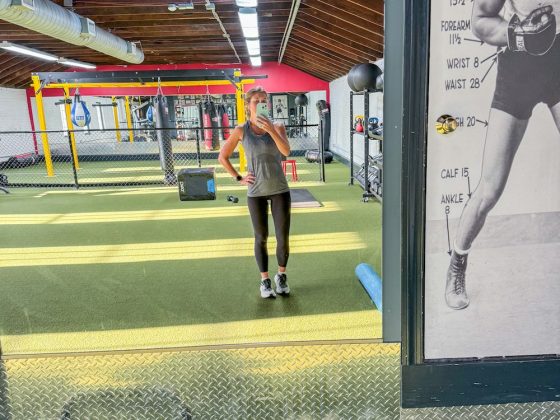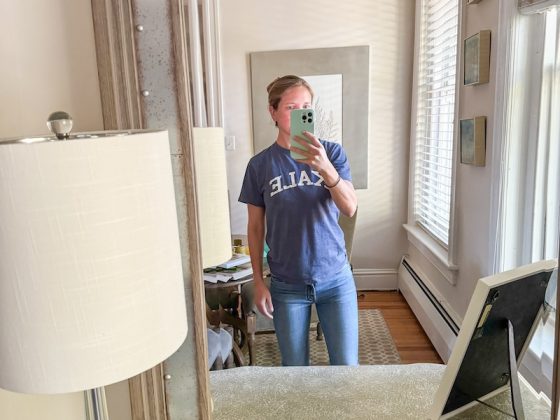I love self-help. From podcasts to books, to reading research, to asking my own intuition, I see myself as a lifelong student and try to learn something new every day. As I sit here typing this post, there is a stack of seven books to my left across various topics that I told myself I was going to read this month in order to expand my knowledge. How I thought I was going to have time to read seven books in one month is beyond me, but I digress.
As I get closer to 40, I see the increasing importance of functional movement and improving my posture, so I picked up The Align Method by Jason Alexander; Jen Sincero makes me laugh while also providing a nice kick in the pants on how to be a better version of myself, so I can’t wait to read her latest book Badass Habits. My husband and I decided we wanted to learn more about wine, so we implemented our own intimate book club around Wine Folly (don’t forget the Wine Folly Tasting Journal!). More recently, I found Katy Milkman’s book How to Change in our home office, and it caught my attention, so I added it to my pile as well.
Behavioral psychology fascinates me. As a health coach and fellow human being, I think it is so interesting to more clearly understand the science behind why we choose to do what we do and don’t do. Then as a subset subject matter, there is the concept of habit formation, which can sometimes be categorized as choices, but can also be something we do on autopilot. Milkman’s book takes a deep dive into behavioral psychology. I have yet to read it, but when I saw she had been interviewed on one of my favorite podcasts, I selected her episode immediately.
In the conversation, she gave a really great overview of the psychology behind human behavior, habit formation, and strategies we can all use to make better decisions. But it wasn’t until the end of part two that she explained the difference between consistency and flexibility, and which one is more likely to lead to sustainable, positive behavioral change. I think this piqued my interest for a couple of different reasons: (1) the results of her study went against what I would have intuitively expected, and (2) the results of her study went against what I thought always worked for me, but have since realized in recent years, doesn’t really work for me at all.
In my teens, twenties, and even into my early thirties, I called myself a creature of habit. I thrived in routine and structure, and felt most successful when I approached projects and goals with consistency. The concepts of flexibility and “going with the flow” – something I now strive for – were nowhere to be found. If I didn’t do something at a certain time, I then worried I would never get it done. Exercise is a good example of this. I would always work out at the same time every morning. Productivity is another area where these concepts can be applied, and as I find myself struggling with this one in (relatively new) motherhood, I find myself wondering if I need to do a better job at actually blocking time in my calendar to accomplish what I need to…to remain consistent. Now I am not so sure. Overly-structured routine can be synonymous with too much rigidity, and the outcome of her research study on the matter makes me think rigidity may hinder results.
In the study, they divided the participants into two groups to analyze the effectiveness of consistency and flexibility on establishing a sustainable exercise routine. One group was told to exercise at the same time every day (consistency), while the other group was told to exercise daily, and it didn’t matter what time (flexibility). All participants were paid each time they went to the gym (i.e. they were incentivized). They found that the group with more flexibility went to the gym more than the participants with the routinized schedule, both when they were incentivized, and even after the incentives ended. This study suggests that too much rigidity can be counterproductive for habit formation. Giving yourself permission to be more fluid with your goals could lead to positive results.
What needs to be taken into consideration, however, is how much flexibility you have in your schedule. If you work a 9am to 5pm job, and you know you are more likely to exercise before work than after, then consistency might be just what you need. But if you are a work-from-home entrepreneur with more dynamic days, then having a less fixed idea of when you need to do something may be your best bet.
Let’s take my goal to write more. I love writing, blogging, recipe creation, but since becoming a mom, I have less time for it. I recently told myself that if I wanted to fit it in, I would have to wake up early and write consistently in the morning before my son wakes up. I immediately figured out this wasn’t going to work for me. First of all, the time my son wakes up is unpredictable. Sometimes it is 7am or later; other times it is before 6am. Even if he does sleep in, my brain doesn’t exactly fire for at least an hour after I wake up. I would rather take any early morning moments to myself to read self-help books (see aforementioned books above. I have my work cut out for me). Therefore instead, I have set a specific goal to write one post a week, when I can, no matter the time, and I have already found more success in that strategy (full disclosure: I just listened to this podcast episode this morning, thus setting this goal today, and am already doing it! It is the middle of the afternoon and not first thing in the morning. Win-win!).
Meditation is another example for me. Ideally, I would meditate every morning after I make my coffee (sitting and breathing is something I can do without having to be overly caffeinated). However I know that if I don’t meditate first thing, I have given myself permission to do any amount of time at any time of day (yes, it can just be 20 seconds when sitting at a stoplight if needed).
I think the main thing to keep in mind is do what works for you, also allowing yourself to question that if the way you have always done things is no longer working – especially if it comes down to whether you are being too rigid in your goal achievement efforts – it could be a matter of giving yourself permission or releasing some of the pressure you put on yourself.










